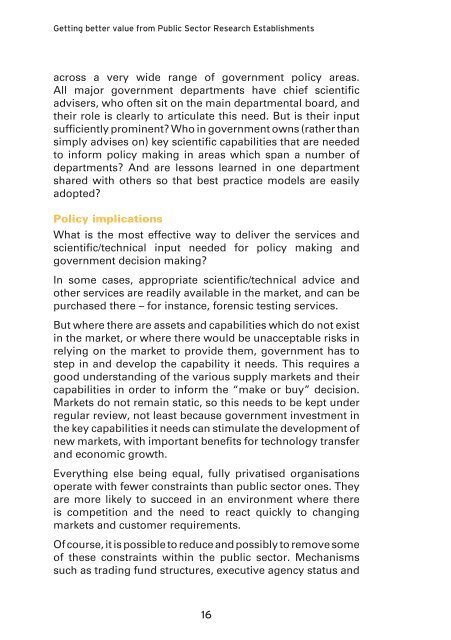Getting better value from public sector research ... - CentreForum
Getting better value from public sector research ... - CentreForum
Getting better value from public sector research ... - CentreForum
You also want an ePaper? Increase the reach of your titles
YUMPU automatically turns print PDFs into web optimized ePapers that Google loves.
<strong>Getting</strong> <strong>better</strong> <strong>value</strong> <strong>from</strong> Public Sector Research Establishments<br />
across a very wide range of government policy areas.<br />
All major government departments have chief scientific<br />
advisers, who often sit on the main departmental board, and<br />
their role is clearly to articulate this need. But is their input<br />
sufficiently prominent? Who in government owns (rather than<br />
simply advises on) key scientific capabilities that are needed<br />
to inform policy making in areas which span a number of<br />
departments? And are lessons learned in one department<br />
shared with others so that best practice models are easily<br />
adopted?<br />
Policy implications<br />
What is the most effective way to deliver the services and<br />
scientific/technical input needed for policy making and<br />
government decision making?<br />
In some cases, appropriate scientific/technical advice and<br />
other services are readily available in the market, and can be<br />
purchased there – for instance, forensic testing services.<br />
But where there are assets and capabilities which do not exist<br />
in the market, or where there would be unacceptable risks in<br />
relying on the market to provide them, government has to<br />
step in and develop the capability it needs. This requires a<br />
good understanding of the various supply markets and their<br />
capabilities in order to inform the “make or buy” decision.<br />
Markets do not remain static, so this needs to be kept under<br />
regular review, not least because government investment in<br />
the key capabilities it needs can stimulate the development of<br />
new markets, with important benefits for technology transfer<br />
and economic growth.<br />
Everything else being equal, fully privatised organisations<br />
operate with fewer constraints than <strong>public</strong> <strong>sector</strong> ones. They<br />
are more likely to succeed in an environment where there<br />
is competition and the need to react quickly to changing<br />
markets and customer requirements.<br />
Of course, it is possible to reduce and possibly to remove some<br />
of these constraints within the <strong>public</strong> <strong>sector</strong>. Mechanisms<br />
such as trading fund structures, executive agency status and<br />
16





